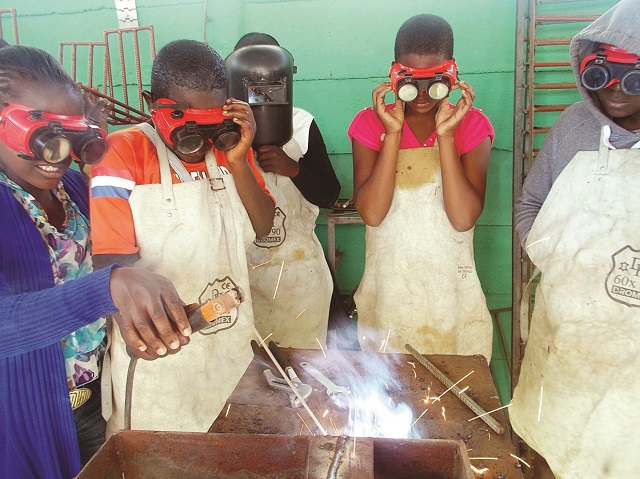Wonderland in Pumula: How orphans built own home

Bruce Ndlovu
ON the surface, the building joined at the hip with Pumula High School looks like any other children’s wonderland.
The freshly painted swings shine in the brightness of a noon that bathes the playground in light on a fair weathered day.
The random splash of colour on the playground makes one feel like they are just a mere character on a sketchpad page on which one of the centre’s toddlers is furiously scribbling away with their crayons.
However, the centre’s children barely seem to notice either the blue and red painted playtime accessories or the gruelling obstacle course besides it. Their attention is elsewhere. Under the umbrella offered by a wild fruit tree’s leaves, a youth in his teens leads them in song.
He is the Peter Pan of this Neverland where HIV/Aids orphans come not only to play but to learn critical skills that equip them for the tough life that awaits any orphan.
The centre is run by the Zimkids Orphan Trust and of the roughly 300 kids gathered, 25 percent are HIV positive while 90 percent had parents claimed by the ruthless scourge.
The orphans are drawn from Ward 17, an area comprised of Pumula suburb as well as Methodist, St Peter’s and Robert Sinyoka peri-urban areas. What makes this wonderland unique is that, like J.M Barrie’s magical world of Peter Pan, it is both populated and led by children.
The young men and women leading the children, some as young as two years old, double as teachers and administrators.
Not only do they lead or educate, but they also built the centre from scratch. With their teenage hands, they brought steel, wood and concrete together to construct the centre that now includes a multipurpose classroom complete with kitchen and library, a computer training centre, storage facilities, toilet block, caretaker house/office, a performance roundhouse, a sewing centre and a pre-school building.
In the global scramble to help young people living with HIV/Aids, the world may have forgotten how young people can also aid in the process. The centre stands as the clearest testimony of how the industry and imagination of youth can be harnessed to combat the deadly scourge.
However, despite its seemingly tranquil setting, the centre is not a mythical land stolen from a page in a fairytale. The story of Zimkids Orphan Trust begins with sickness, sadness and death.
It all began when American expatriate Mr Dennis Gaboury, who came to Zimbabwe accompanying his wife who had come to lecture at the National University of Science Technology (Nust), came face to face with the ruthless face of the virus.
“I met a woman called Patricia Tshabalala in Mpopoma (suburb) and she introduced me to orphans. There was a particular day when she had 200 kids in the room and these white ladies had come to give them bread or tea. They were just sitting at a table with a table cloth and me being the American, I wasn’t particularly comfortable with that so I stayed in the corner. Patricia asked this little boy to sing. It was obvious he was very sick yet at the same time he managed to get up. His hair was brown and his skin was pale. With a weak voice he got up and managed to sing. I thought to myself if this child can get up and entertain people in this condition then I can also do something,” said Mr Gaboury.
From the beginning, Mr Gaboury’s idea was simple: put trust and responsibility in the hands of the children.
“I started a competition in which kids made water toys and dolls. From that activity we got businesses to supply prizes. After a year or two I took some of the dolls to America. After that more people offered to contribute and so we started a food distribution network back in 2008.
“We were contributing 25 food baskets but then we decided to stop that as we wanted to feed our kids directly because a lot of our food was being eaten by the adults,” said Mr Gaboury.
While giving the children food was all well and good, Mr Gaboury felt that for his initiative to truly thrive they needed a centre, a location that was to be the heartbeat pumping life into a community that was haunted by the realities of HIV/Aids.
“So in 2011, the City gave us this spot. We had to dig quite deep at some places to get all the trash out. We had places where kids would pick up glass with buckets. In 2011 we had a council of elders who ran all our programmes and we built all these buildings,” said Mr Gaboury.
The ambitious American’s council of elders was elderly in name only, as he plucked a bunch of orphaned teenagers from the community and thrust them with the responsibility of raising the multipurpose centre from dust. The biographies of most of this council of elders tell a heartbreaking tale of their own.
Early childhood loss and suffering is the distinct thread that runs through all of their lives.
Sithabisiwe Ngwenya, born in 1993, joined Zimkids at the age of 14, four years after the death of her father. Since the death of her mother seven years ago, she took responsibility of her two younger siblings.
A then teenaged Sithabisiwe was crucial in the building of the centre, digging foundations, laying bricks, mixing cement, plastering, and welding. “Where I grew up it was believed that such duties were for boys,” said Sithabisiwe.
Born in 1995, Nkosikhona Moyo lost his father two months after he was born and was raised by a grandmother who sold tomatoes and vegetables by the side of the road to feed him.
He joined Zimkids at the age of 11 and became a member of the council of elders at the time when the eldest Zimkids were working on the construction of the centre.
The centre’s director Mr Tinashe Basa remembers the uncertainty of those early days.
“First of all we thought he (Mr Gaboury) was out of his mind because we were all young. He just said find out how much it will cost to build in this area and after we found out, he asked us to find quotations for everything and we then bought what was needed.
“Then he said ‘I’ve got news for you, you are the ones that are going to build the centre.’ We said are you crazy? How can we do it without professionals helping us?” said Mr Basa.
Dumped by his mother with relatives in a rural area at the age of two, sick for a full year when he was five because of malnutrition, and having been pulled out of school at the age of 15 and sent to work in the tobacco fields, Mr Basa like the other “elders” was used to having great odds stacked against him.
With a staff hardened by life and eager to work Mr Gaboury was undeterred, shepherding the teenagers through the construction period.
“My whole experience in life came into play here. I was able to teach everyone how to build, how to do electrical work, how to weld, how to sew, how to upholster a couch. The kids did it all,” said Mr Gaboury.
With so many organisations focused on only the nutrition of children affected and infected by HIV/Aids, Mr Gaboury’s vision for the trust was to not only appease the children’s grumbling stomachs, but also feed their minds.
“Just giving food is not enough. It’s not enough. They will go back home and get hungry then come back again. So the plan is to give them life skills because they can go back and take care of their siblings or grandparents,” said Zimkids Programmes Director Mr Philip Mudoyi.
Mr Basa is one of the greatest examples of this as, after a deprived early upbringing, he went on to assemble his own computer at the centre.
“I’m so interested in technology but I never got a chance to pursue it so one day I was at Dennis’ house because I met him when I was 17. I saw his laptop and was fascinated. When he went to bed, I would stay behind and play with his laptop. Two years later, I managed to build my own computer which runs on 2 terabyte memory 16 gig RAM,” said Mr Basa.
Wise beyond his years, Mr Basa is now helping other children discover gifts hidden by poverty and buried by sickness.
“We teach them how to handle a laptop. We show them how to pull a laptop apart. We start this with the pre-school kids,” said Mr Basa.
Although from the outside, the orphanage looks magical, it is not unaffected by what goes on in the outside world. While the centre may seem like an island separated from the rest of Pumula, once in a while the ills that plague the community wash up on its doorstep.
“Keeping everything as good as it is hard. In communities like this there are hassles and challenges. There are girls growing up so all of a sudden you will find one has become pregnant. Most don’t reach ‘O’ Level. So our main goal is to get them to finish ‘O’ Level and that’s difficult in itself because this is not a centre where they stay. Along the way home and at home there are a lot of things that happen,” said Mr Mudoyi.
Despite the challenges, Mr Gaboury is convinced that the centre has an even brighter future, considering that the staff is still mostly young although this fact sometimes brings its own problems.
“You’re working with people who’re not mature. You’re dealing with people who will get angry at you because of hormones and such. You’re trying to teach them a world of work when they have never seen anyone in their families work. But we’ll win. We’re winning,” said Mr Gaboury.













Comments